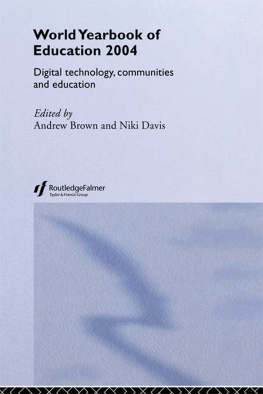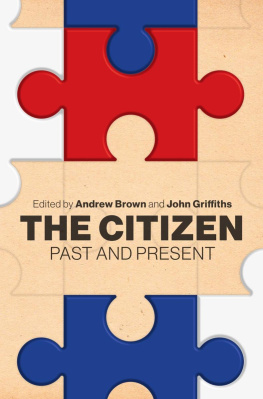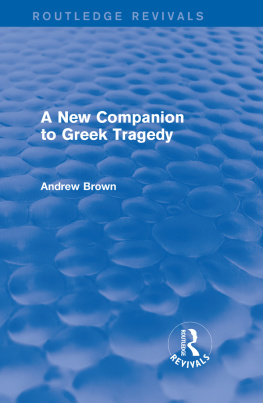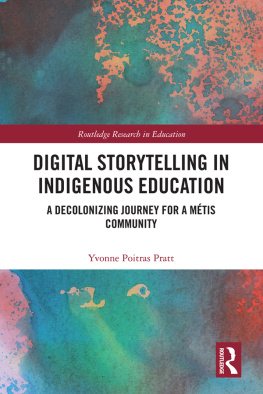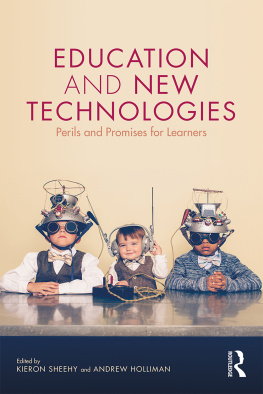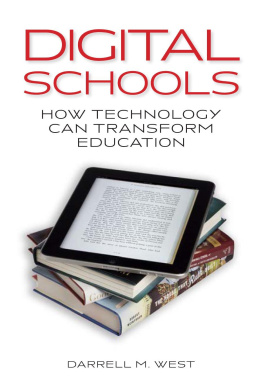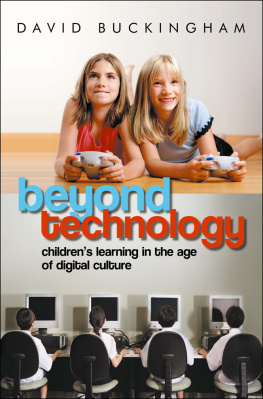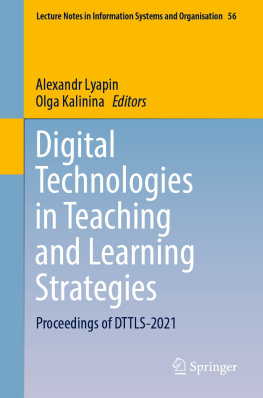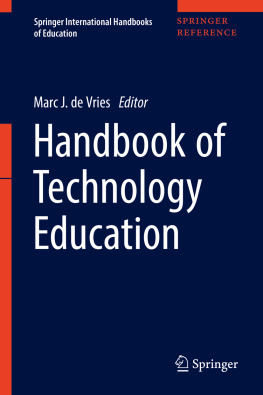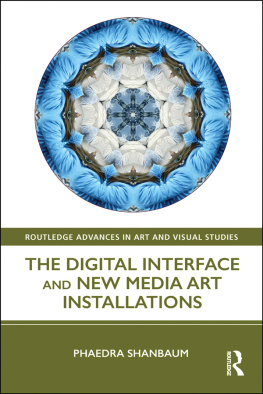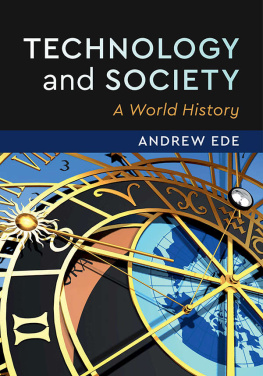World Yearbook of
Education 2004
World Yearbook of
Education 2004
Digital technology, communities
and education
Edited by
Andrew Brown and
Niki Davis

First published 2004
by RoutledgeFalmer
11 New Fetter Lane, London EC4P 4EE
Simultaneously published in the USA and Canada
by RoutledgeFalmer
29 West 35th Street, New York, NY 10001
This edition published in the Taylor & Francis e-Library, 2004.
RoutledgeFalmer is an imprint of the Taylor & Francis Group
2004 editors and individual contributors
All rights reserved. No part of this book may be reprinted
or reproduced or utilized in any form or by any electronic,
mechanical, or other means, now known or hereafter
invented, including photocopying and recording, or in
any information storage or retrieval system, without
permission in writing from the publishers.
British Library Cataloguing in Publication Data
A catalogue record for this book is available from
the British Library
Library of Congress Cataloging in Publication Data
A catalog record for this book has been requested
ISBN 0-203-41617-1 Master e-book ISBN
ISBN 0-203-43852-3 (Adobe eReader Format)
ISBN 0-415-33493-4 (Print Edition)
Contents
Introduction
ANDREW BROWN AND NIKI DAVIS
Learning, a semiotic view in the context of digital technologies
GUNTHER KRESS
Networking and collective intelligence for teachers and learners
BERNARD CORNU
Multimedia learning in the digital world
JOS L. RODRGUEZ ILLERA
Children's concepts of ICT: pointers to the impact of ICT on education within and beyond the classroom
BRIDGET SOMEKH
(Dis)possessing literacy and literature: gourmandizing in Gibsonbarlowville
SOH-YOUNG CHUNG, PAUL DOWLING AND NATASHA WHITEMAN
Rethinking and retooling language and literature teaching
RONALD SOETAERT, ANDRE MOTTART AND BART BONAMIE
Playing and learning with digital technologies at home and at school
TONI DOWNES
Learning and teaching adult basic skills with digital technology: research from the UK
HARVEY MELLAR AND MARIA KAMBOURI
Teachers and teaching innovations in a connected world
NANCY LAW
Teaching with video cases on the Web: lessons learned from the Reading Classroom Explorer
RICHARD E. FERDIG, LAURA R. ROEHLER, ERICA C. BOLING, SUZANNE KNEZEK, P. DAVID PEARSON AND AMAN YADAV
Digital technology to empower indigenous culture and education
PAUL RESTA, MARK CHRISTAL AND LORIENE ROY
Refugee children in a virtual world: intercultural online communication and community
LIESBETH DE BLOCK AND JULIAN SEFTON-GREEN
The role of local instructors in making global e-learning programmes culturally and pedagogically relevant
MICHELLE SELINGER
Case method and intercultural education in the digital age
MARSHA A. GARTLAND, ROBERT F. MCNERGNEY, SCOTT R. IMIG AND MARLA L. MUNTNER
Intercultural learning through digital media: the development of a transatlantic doctoral student community
ANDREW BROWN AND NIKI DAVIS
A cross-cultural cadence in E: knowledge building with networked communities across disciplines and cultures
ELSEBETH K. SORENSEN AND EUGENE S. TAKLE
Telecollaborative communities of practice in education within and beyond Canada
THRSE LAFERRIRE, ALAIN BREULEUX AND GAALEN ERICKSON
Informatics teacher training in Hungary: building community and capacity with tele-houses
MRTA TURCSNYI-SZAB
Building communities of practice in New Europe
CHRISTINA PRESTON AND LAURA LENGEL
A systemic approach to educational renewal with new technologies: empowering learning communities in Chile
PEDRO HEPP, J. ENRIQUE HINOSTROZA AND ERNESTO LAVAL
Illustrations
Figures
Tables
Contributors
Liesbeth de Block, Institute of Education, University of London, UK
Erica C. Boling, Rutgers University, USA
Bart Bonamie, Ghent University, Belgium
Alain Breuleux, McGill University, Canada
Andrew Brown, Institute of Education, University of London, UK
Mark Christal, Smithsonian Institution, National Museum of the American Indian, USA
Soh-young Chung, Sogang University, Seoul, Korea
Bernard Cornu, University of Grenoble and La Villa Media, France
Niki Davis, Iowa State University, USA, and Institute of Education, University of London, UK
Paul Dowling, Institute of Education, University of London, UK
Toni Downes, University of Western Sydney, Australia
Gaalen Erickson, University of British Columbia, Canada
Richard E. Ferdig, University of Florida, USA
Marsha A. Gartland, University of Virginia, USA
Pedro Hepp, Universidad de La Frontera, Chile
J. Enrique Hinostroza, Universidad de La Frontera, Chile
Scott R. Imig, University of Virginia, USA
Maria Kambouri, Institute of Education, University of London, UK
Suzanne Knezek, Michigan State University, USA
Gunther Kress, Institute of Education, University of London, UK
Thrse Laferrire, Universit Laval, Canada
Ernesto Laval, Universidad de La Frontera, Chile
Nancy Law, University of Hong Kong, China
Laura Lengel, Bowling Green State University, USA
Robert F. McNergney, University of Virginia, USA
Harvey Mellar, Institute of Education, University of London, UK
Andre Mottart, Ghent University, Belgium
Marla L. Muntner, University of Virginia, USA
P. David Pearson, University of California-Berkeley, USA
Christina Preston, Mirandanet, UK
Paul Resta, University of Texas at Austin, USA
Jos L. Rodrguez Illera, University of Barcelona, Spain
Laura R. Roehler, Michigan State University, USA
Loriene Roy, University of Texas at Austin, USA
Julian Sefton-Green, WAC Performing Arts and Media College, London, UK
Michelle Selinger, Cisco Systems, UK
Ronald Soetaert, Ghent University, Belgium
Bridget Somekh, Manchester Metropolitan University, UK
Elsebeth K. Sorensen, Aalborg University, Denmark
Eugene S. Takle, Iowa State University, USA
Mrta Turcsnyi-Szab, Etvs Lornd University, Hungary
Natasha Whiteman, Institute of Education, University of London, UK
Aman Yadav, Michigan State University, USA
Series editors introduction
The World Yearbooks of Education have dealt with topical educational issues for well over fifty years now. Many of the topics covered in recent volumes would have been familiar to the original editors since many educational issues stay constant the management of schools and vocational education would be two examples. At first glance, the topic of this Yearbook would appear to be novel, for both the speed of development in digital technology and its impact on education almost appear to have suddenly sprung upon us. But this is not really the case. Like vocational education and the management of schools, the impact of new technologies on education has also been a recurring topic. The 1982

